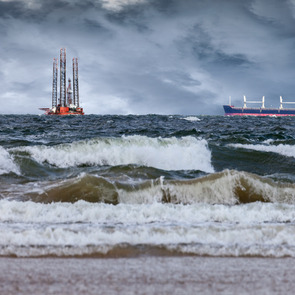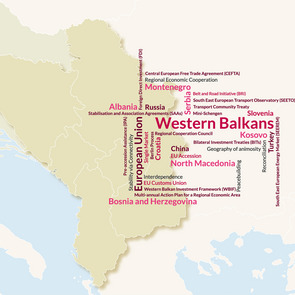|
|
|
|
|
Please click here if this newsletter looks incorrect

|
|
|
|
|
|
|
Sovereign Europe
|
Newsletter on European Topics
November 2020
|
|
|
AUTOMATING SOCIETY REPORT
The deployment of automated decision-making (ADM) and AI-based systems in Europe has vastly increased over the last two years. Used by public authorities and private companies alike, they affect the lives of millions of citizens. But transparency, oversight and competence are still lacking. There is an urgent need for policy makers at EU and member state level to address this gap, otherwise they risk to jeopardize the potential benefits of such systems. This is the result of the most comprehensive research on the issue conducted in Europe so far, AlgorithmWatch and we compiled for the 2020 edition of the Automating Society report. More
|
|
| |
eupinions brief
While US citizens are electing their next president, the world is watching them with suspense. Will they re-elect President Trump who will keep continuing to disrupt politics as we know it? Or will they choose former Vice-President Biden who is presenting himself as the candidate of unity and continuity? These were pressing questions before Election Day. We checked in with EU citizens to find out how they feel about the US and its election. In a nutshell: Donald Trump’s presidency has had a sobering effect on Europeans. They appreciate the importance of the EU-US relationship, but do not believe it’s a “shining city upon a hill”. Please find our latest eupinions brief here.
|
|
| |

|
Policy Paper
The Black Sea and Caspian region is a part of the EU neighborhood that is increasingly becoming a conflict zone. Having flouted international law by annexing Crimea, the Russian Federation is taking further steps to strengthen its military, political and economic dominance in the region. We see patterns of action emerging that are gradually shifting the balance of power in a strategically important region that serves as a corridor for trade and energy routes between Europe and Asia. In addition to Russia, China and Turkey are also expanding their influence, as are Iran and Saudi Arabia. Among the issues addressed by the experts who have contributed to the policy paper titled “Antagonisms in the EU’s Neighbourhood – Geopolitical Ambitions in the Black Sea and Caspian Region” are how these key states interact with each other, the concerns driving their actions, and how Berlin and Brussels can protect European interests in the region.
Find the German study here.
An English translation of the paper is now also available.
|
|
| |

|
Policy Paper
Unfortunately, so far, the rule of law has remained a pipe dream for many people on Europe’s periphery. Reports on transformation processes often cite corruption as one key factor hindering sustainable reforms. If corruption is systemic, citizens have no trust in state institutions. This plays into the hands of populists. Such developments pose a threat to democracy and peace.
The European Commission has outlined new goals for the future Eastern Partnership policy beyond 2020. Improving governance is emphasised by the focus on the rule of law and the fight against corruption. Our analysis sheds some light on why it is that even unpopular power constellations can be changed with only great difficulty, even in the favourable case of willingness and joined efforts of reform-oriented citizens and international partners. Europe should continue to engage nevertheless, because well-governed neighbourhoods are of vital interest to us all.
The English version of our country reports on Armenia, Azerbaijan and Georgia is now available.
|
|
| |
Making Prevention Work
How does prevention work for children, youth and families in European countries? What support structures do communities have for implementing the Child Guarantee? What could Germany learn from its neighbors?
The research accompanying the “Leave no child behind! Municipalities providing opportunities” project looked for answers in eleven countries and provides a close-up look at the model approaches in Austria, France and the Netherlands. More
|
|
| |

|
Publication
The research report "Pushing on a string? An evaluation of regional economic cooperation in the Western Balkans", written jointly with the Vienna Institute for International Economic Studies (wiiw), examines why the EU strategy of regional cooperation has had little impact in the Western Balkans.
Our main findings are a) that many of the most important prerequisites for regional cooperation have not existed in the Western Balkans during the past two decades, and that the potential gains from the EU strategy have therefore always been quite limited; b) that regional trade, investment and infrastructure integration has increased somewhat, but that there are still many gaps and challenges ahead; and c) that these efforts have not fundamentally altered the main obstacles to normalising political relations in the Western Balkans and, ultimately, to the EU accession of its constituent countries.
We draw from these findings that more effort should be focused on securing the maximum possible level of economic integration with the EU, and that without a political breakthrough – especially regards the normalisation of relations between Serbia and Kosovo – no amount of regional cooperation initiatives can fundamentally change the situation in such a way that it could increase the chances of EU accession. More
|
|
| |
Report
Technologies such as contact-tracing apps and facial recognition software are raising hopes for improved containment of the COVID-19 pandemic. As a result, several algorithmic decision-making systems (ADM) have been rapidly implemented throughout Europe. In this special issue of the Automating Society Report, the Bertelsmann Stiftung and AlgorithmWatch provide an overview of European ADM systems designed to combat the pandemic as well as a classification of the various digital tools in use and the consequences they have for society. More
|
|
| |
Reflection Group on European Public Goods
At its last meeting in October, the high-level Reflection Group focused its discussion on European public goods that have a significant external dimension, namely EU-China economic relations and the prospects of digital sovereignty for the EU. The participants also took stock of the progress of the Group over the past two years, and looked beyond to identify the big institutional and policy challenges for the EU in the upcoming years. A short synthesis of the Group's work can be found here.
|
|
| |
Event
“Next Generation EU” (NGEU) has been introduced by the Commission and the Council to counter the negative impacts of the COVID-19 crisis. As it is still up to the Parliament to implement it into legal basis, there are uncertainties about how NGEU is concretely going to work. In a virtual event organized by the Espacio Bertelsmann in cooperation with the Europe’s Future programme, the German embassy in Madrid and the European Commission, European experts came together to discuss the design of NGEU in order to achieve a new strong European economy. More
|
|
| |
|
|
To unsubscribe from our Newsletter Sovereign Europe, please send an email to focus-europe@bertelsmann-stiftung.de.
We appreciate your questions and suggestions:
Jake Benford
Program Europe´s Future
Bertelsmann Stiftung
Werderscher Markt 6
10117 Berlin
Germany
Phone: +49 30 275788-157
Fax +49 5241 81-681302
E-Mail: focus-europe@bertelsmann-stiftung.de
Website: www.bertelsmann-stiftung.de/de/themen/europa/
The Bertelsmann Stiftung, based in Gütersloh, Germany, is a nonprofit, private
operating foundation in accordance with Section 1 of North Rhine-Westphalia's Foundation Law.
The district government of Detmold serves as its supervisory authority.
Founder: Reinhard Mohn
Chairman of the Board of Trustees: Bodo Uebber
Executive Board: Dr. Johannes Ametsreiter (Chairman), Dr. Brigitte Mohn, Prof. Dr. Daniela Schwarzer
|
|
|
|
|
|
|